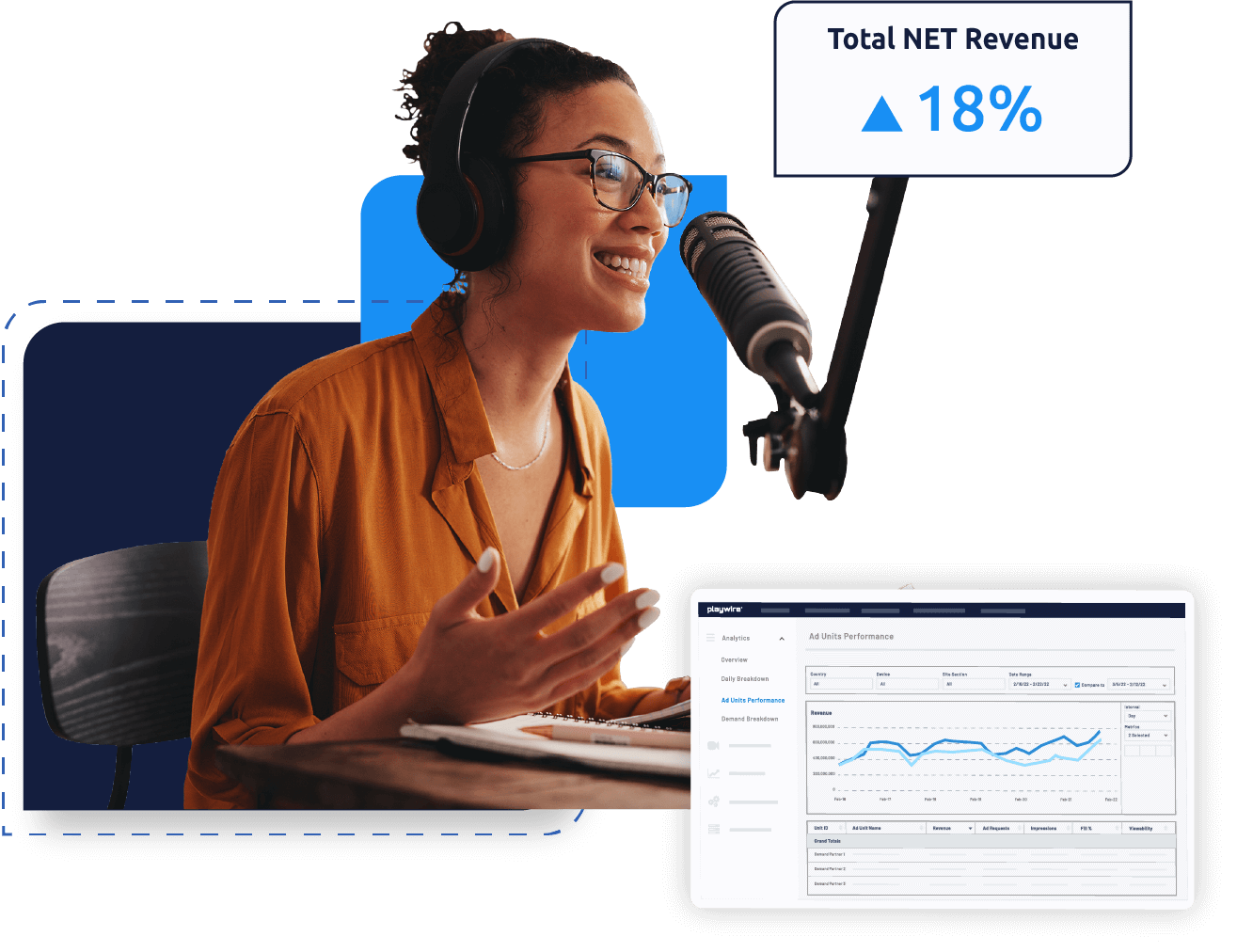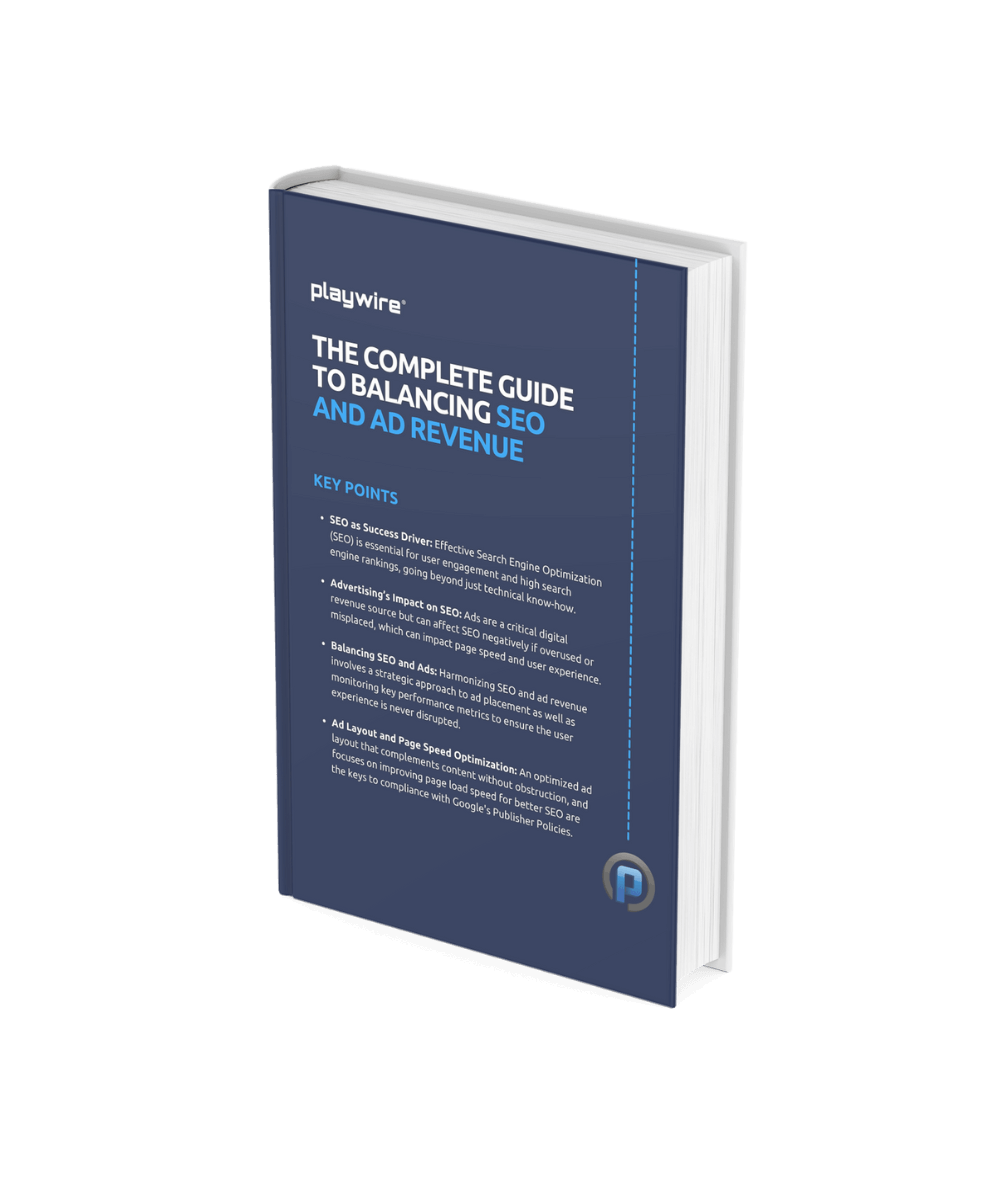.png?width=200&height=80&name=Lambgoat%20(1).png)
The Complete SEO & Ad Revenue Resource Center

Balancing SEO and Ad Revenue
For most content creators and publishers, Search Engine Optimization (SEO) is the most important source of website traffic, laying the groundwork for a sustainable online presence.
But getting to the first page of Google is no easy feat. In fact, less than 1% of searchers even click on the second page of Google search results. So, while crafting great content might be your main priority, you can’t afford to neglect building a strong SEO strategy.
No matter your niche, vertical, or chosen platform, navigating the delicate balance between SEO and ad revenue is a difficult, but essential balancing act if your end goal is to turn your content into a money-making machine. Too much weight in one area, and the scales can tip unfavorably.
Further, striking the perfect balance between SEO and ad revenue isn’t just beneficial, it’s essential for thriving in a competitive online advertising landscape.

The Complete Guide to Balancing SEO and Ad Revenue
GUIDE
Learn everything you need to know about balancing SEO and ad revenue with this comprehensive guide from our experts.
with SEO
An Introduction to the Interplay Between SEO and Ad Revenue Generation
Imagine a tightrope. On one side, there’s Search Engine Optimization (SEO). On the other is ad revenue. Learn how to master walking this digital tightrope with confidence in the article below.
Why Content Creators Need to Prioritize SEO Before Turning Their Attention Toward Monetization
Learn how to perfectly balance your SEO strategy and content monetization desires beginning with getting the order of operations right. Dive in!
The Interplay Between Page Speed, SEO, and Ad Revenue
ARTICLE
Page speed is not only important for SEO purposes but also for the user experience. And yes, these two are intimately intertwined. The purpose of SEO is to not only make Google’s algorithms happy but your audience happy; in fact, the two are directly correlated.
Ultimately, the trick is to strike the perfect balance between ad layout, ad density, and page load speed, all while you craft fantastic content that gets right to your audience’s needs. Are you up for the challenge?
Tips and Tools
for Success
A Guide to Increasing Website Traffic
Explore the basics of increasing website traffic and uncover strategies for building a robust approach to driving users to your website's content.
10 SEO Tips to Increase Blog Traffic
Dive into some of the most effective SEO tips publishers and content creators can use to increase blog traffic.
The Ultimate SEO Best Practices Checklist
Whether you’re an SEO expert or a fledgling publisher just getting started, follow these SEO best practices to ensure your site starts to move up the rankings.
The 8 Best SEO Tools
Whether it’s helping with keyword research or the analysis of growth metrics, here are several of the best SEO tools for publishers and content creators.
Understanding the Impact of Keyword Rankings and the Best Strategies for Improving Your Search Engine Ranking
ARTICLE
At their core, SEO keywords are just that: words and phrases. But behind this benign phonetic appearance is a whole world of algorithms, search engine rankings, and stiff competition.
Explore the world of keyword rankings, dive into some actionable strategies to improve your search engine presence, and learn about what SEO tools you can use to optimize not only your rankings but also your revenue.
Growing its Community with Next-Level Support and Analytics: The Lambgoat Story

50% More Revenue
Frequently Asked Questions
How much do keywords matter with SEO rankings?
Less than 1% of searchers move past page one of Google.
To get to those users and drive them to your content, you need to master keyword rankings. While we might not know the ins and outs of the Google search algorithm, we know that its whole goal is to help users find relevant content fast.
Keywords? They’re the beacons that light up your site as a relevant source of information meaning the right keywords make all the difference.
What are the different types of keywords?
There are a few different types of keywords, and each ties to a specific type of search intent:
- Informational keywords target searchers looking for information.
- Navigational keywords help searchers find a specific page.
- Commercial keywords target users who want to investigate brands, products, or services.
- Transactional keywords help searchers complete an action, like making a purchase.
The right mix of keywords will help Google better understand the content on your site. The more relevant, helpful, and original Google thinks your site is, the higher in the rankings you’ll be. And the higher your search engine rankings, the higher the chance you’ll get that click from the user.
What are the best SEO tools?
Some of the 8 best SEO tools for increased revenue generation include:
- Google Search Console
- Google Analytics
- Google Keyword Planner
- Google Trends
- Semrush
- Surfer
- Moz Pro
- PageSpeed Insights
Learn more about what makes each of these unique SEO tools powerful, here.
How can I increase my blog traffic?
With 93% of online experiences starting with a search engine, mastering SEO is essential to finding and growing an audience and building a steady flow of blog traffic.
Some of the best SEO tips publishers and content creators can use to increase blog traffic include:
- Understand your audience
- Master keyword research
- Focus on creating great content
- Build quality backlinks
- Regularly refresh and update old content
- and more!
Click here to keep reading our SEO tips for increasing blog traffic.
What are the best SEO best practices to follow?
The best SEO best practices to follow include:
- Identify the Right Keywords
- Optimize Your Title Tag
- Use Proper Heading Structure
- Master Meta Descriptions
- Get the Right Keyword Placement on Page
- Develop an Effective Linking Strategy
- Always Focus on Content Quality
- Watch Page Load Speed
- Stay Up to Date on Changes
- Utilize the Right SEO Tools
Amplify
Your Ad Revenue
Accelerate your business and uncomplicate your ad tech stack, because you deserve a partner and a platform that demands more for you.